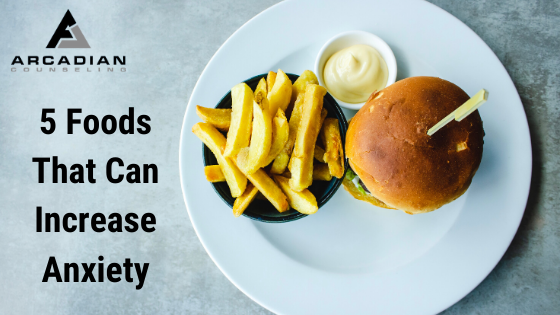Recent statistics estimate that almost 20% of Americans struggle with an anxiety disorder. And we all experience anxiety in some form or another as a normal response to certain situations.
Those who live with chronic stress and anxiety will spend much of their lives managing their symptoms with things like mindfulness, anxiety therapy, exercise, and even medication.
While most people know that a healthy diet is important in managing weight, many people don’t realize the foods we eat can significantly alter our mood and increase anxiety symptoms.
While eating foods rich in protein, antioxidants and omega-three fatty acids can help fight depression and other mood disorders, eating the wrong kinds of food can cause depression and anxiety and even worsen symptoms.
If you struggle with high levels of stress and anxiety or suffer from a mood disorder, it’s important that you can identify which foods may trigger or exacerbate symptoms.
As a general rule, the following 5 foods should be avoided if you find yourself suffering from anxiety.
Caffeine
Do you ever have one too many cups of coffee and a little while later had the jitters? Coffee, and caffeine, can worsen existing anxiety and even cause it in people who don’t normally suffer from it. Caffeine increases cortisol levels (one of our “fight or flight” hormones), which in turn makes you feel stressed even when there is no external stressor. Research suggests that lower intakes of caffeine has been linked to less depressive symptoms.
Alcohol
Numerous studies have shown that one or two glasses of wine can be good for your heart. While this may be true for those who don’t suffer from anxiety, those that do should steer clear of alcohol. The National Institute on Alcohol Abuse and Alcoholism has stated that alcohol may worsen mood and even contribute to anxiety.
Sugar
Often people reach for sugary foods like cookies and candy when dealing with a mood disorder. While it may seem that sweet treats are tempting in the moment, sugar actually makes your negative feelings worse. A diet high in sugar causes spikes and drops in blood sugar levels, which can wreak havoc on your moods and even contribute to panic attacks. Further, consuming large amounts of processed sugar can trigger feelings of worry, irritability, and sadness. If you feel like you are prone to high levels of stress or anxiety, you may want to avoid sugary foods as much as possible.
Trans Fat
Trans fats found in fried foods like french fries and packaged snacks are not only bad for your health, but for your mood as well. In fact, studies have found that food containing trans fats, also called hydrogenated fats, can increase your risk of depression. Additionally, studies which have examined the brains of rats found that long periods of consumption of trans fats lead to more anxiety-like symptoms.
Gluten
You don’t have to have celiac disease to be bothered by gluten. Many people don’t realize they have an intolerance to gluten that often shows up in the form of anxiety and panic attacks. A study published in the US national Library of Medicine found that those with gluten sensitivities are more prone to feeling anxious after eating wheat. Often, these sensitivities will not show up on a food allergy test leading individuals to believe they have no issue with gluten or other foods like dairy. Pay close attention to how you feel after you eat foods containing wheat.
There are plenty of reason to eat a clean, whole food diet. Chances are that if you clean up your diet, it can help lower your anxiety and improve your mood. However, if you find that it isn’t enough, it may be worth talking to a professional who can guide you to the root cause of your anxiety and help you learn effective ways to cope and manage.
Are you looking for help with anxiety in New Haven, CT? Contact us today for a free consultation.
James Killian, LPC is the Principal Therapist & Owner of Arcadian Counseling in New Haven, CT where they specialize in helping over-thinkers, high achievers, and perfectionists take control and move From Surviving to Thriving.

